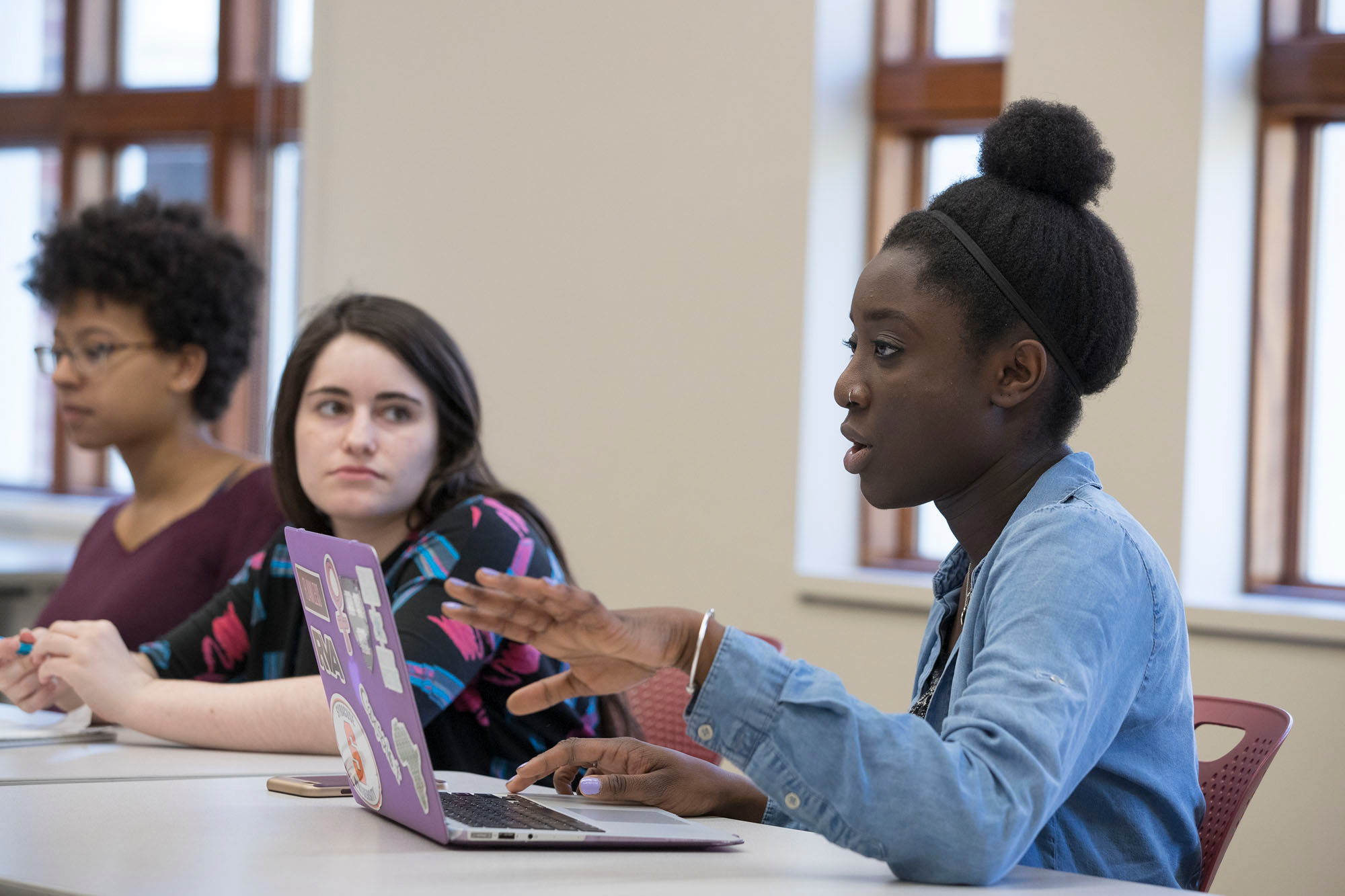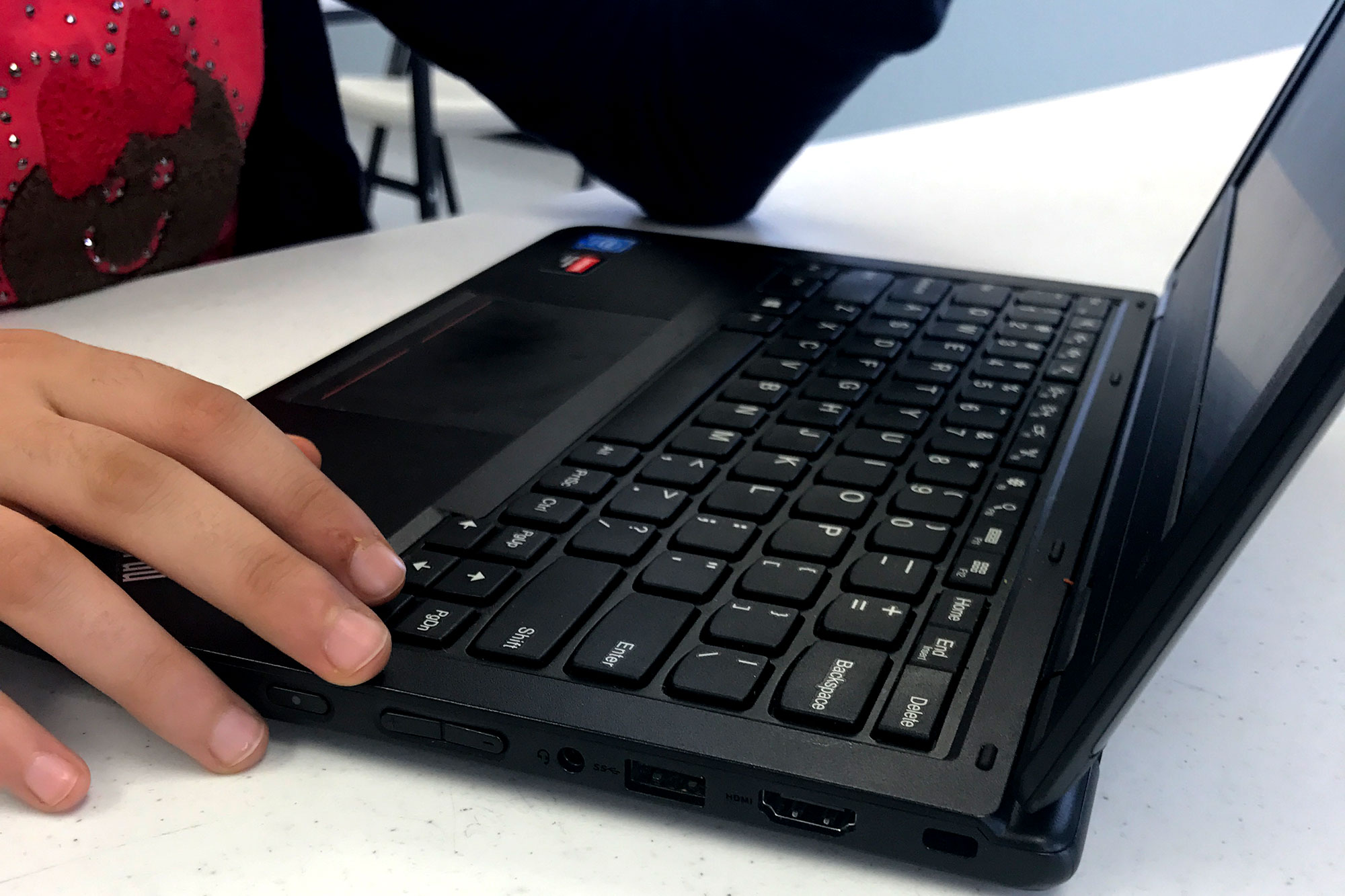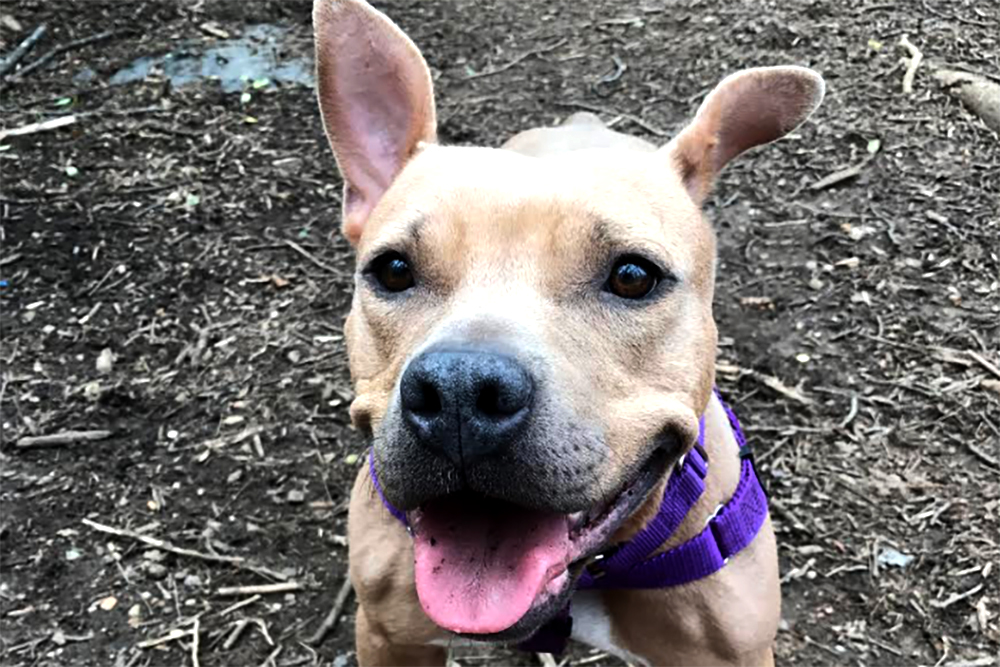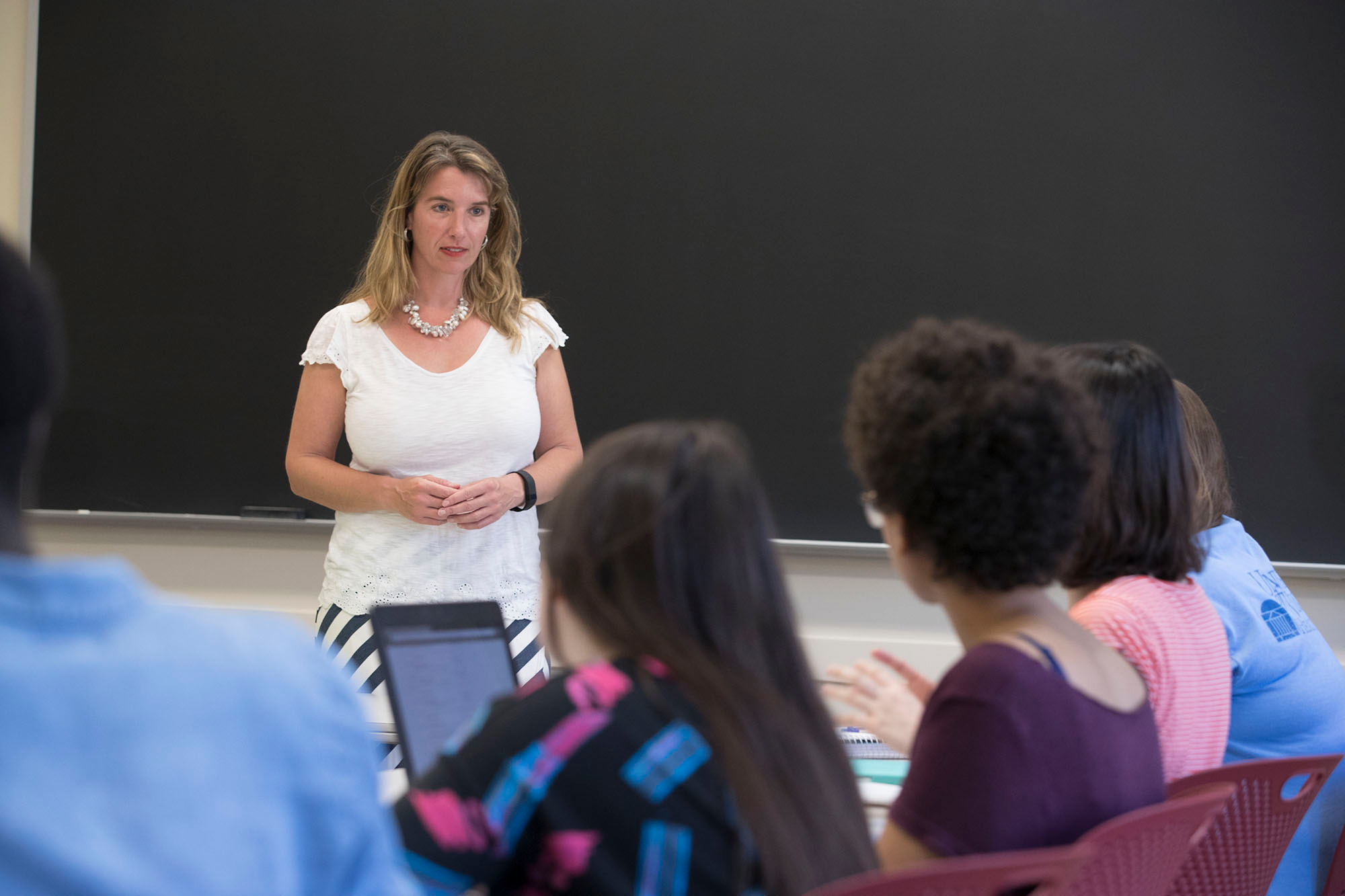“What makes you happy? What do you want to be when you grow up?” University of Virginia student volunteer Mahnoor Khurshid asked the children she tutors.
Then she took photos of them, with titles like “The Next Steve Jobs” and “The Next Picasso,” simple photos of young hands doing things: poised over a laptop or figuring math problems with pencil and paper.
In a recent UVA class that focused on revision, Khurshid, a second-year student from Falls Church who aspires to attend medical school, showed a couple of her classmates the short narratives that explain what the viewer can’t see in each of several photos.
“The purpose of these questions is to show that these children are no different than other children and still have the same hopes and aspirations, despite having to leave their home country,” Khurshid said recently in a session of “Words Matter: Writing, Leadership and Community Engagement,” a pilot, one-credit liberal arts seminar that is wrapping up this semester. “The picture of the girl on the computer has a story that shares her love for computer design,” she said.
The University’s Academic and Professional Writing Program, housed in the English department, partnered this semester with Madison House, UVA’s student volunteer center, to offer the unique seminar that helps student volunteers preserve their public-service experiences through the power of words.
The students are devoting their final projects to writing about and presenting their experiences in ways that expand or enhance the work of the community service program in which they participated. Along with providing information about helpful resources, the projects aim to break down stereotypes and give firsthand accounts of groups they work with and what they need – from refugee children to hospital patients to unwanted pets.

Left to right, students Marrissa Jones, Taylor Campbell and Fota Sall discuss writing and community service in the seminar, “Words Matter: Writing, Leadership and Community Engagement.” (Photo by Dan Addison, University Communications)
“The course explores the relationship between the written word, being a leader and being actively involved in the community,” instructor Kate Stephenson said. Stephenson, who earned her Ph.D. in 20th-century literature from UVA in 2001, has taught writing and composition in a variety of settings and returned to the Grounds a few years ago.
Academic courses that draw on community engagement have gained momentum on college campuses nationwide in recent years, Stephenson said. Community partnerships and volunteering opportunities, however, can be logistically difficult to work out in such an academic program. UVA already has the infrastructure in place to design these types of courses successfully, she said.
Madison House signs up about 3,000 student volunteers every year to work with more than 100 nearby community partners, from local schools and health care providers to the Charlottesville Albemarle Society for the Prevention of Cruelty to Animals.
“I think students are hungry for this intersection between academic work and community service,” Stephenson said, adding that millennials seem to seek purpose in what they do. “This class shows how writing can work to do something in useful ways.”
UVA students in the Muslim Student Association, including Khurshid, tutor Syrian, Afghan or Azerbaijani refugees in math, social sciences and English in partnership with the Islamic Society of Central Virginia mosque. “When I first began tutoring there, I remember being astounded at how smart and bright these children were, despite having such a difficult past,” she said.
“I wanted to start a photo essay that would highlight these children and bring a positive light to what the future holds for them. In doing this, I hope to recruit more volunteers and change perspectives about the refugees who come to America.”

Mahnoor Khurshid, who tutors Syrian refugee children, focused her photos on their hands to show they are like any other children, as well as to protect their privacy. (Photo by Mahnoor Khurshid)
The text with the photo reads:
The Next Steve Jobs
“What is your favorite class in school?”
“Computer design. They teach you how to make a game. So far I’ve made nine. It’s very cool. First you watch a video, and make it with the video. Sometimes you must first draw a picture, and then create the game.” When asked if she would like to do something like this in the future, she responded, wide-eyed, “Of course.”
Jamie Cranmer, a third-year student majoring in biology with a minor in health and wellbeing, said that going through an implicit bias workshop as part of the class prompted her to be more introspective. (“Implicit bias” refers to the attitudes or stereotypes that affect our understanding, decisions and actions in an unconscious manner, and can lead to unfair judgments and behavior.) She has volunteered with several Madison House programs, including “HALO,” or Hoos Assisting with Life Obstacles.
HALO seeks to address hunger, homelessness, unemployment and other issues by helping those in transitional situations help themselves. Through seven different community partners, including the Loaves and Fishes food pantry and the Legal Aid Justice Center, volunteers provide direct assistance to families and individuals in need of food, educational training, companionship or child care.
Cranmer is creating a website that provides information to all these community partners about the resources HALO makes available, aiming to enable them to help clients in a more holistic manner.
She enjoys volunteering as well as writing, she said, and thought the class would be an interesting way to bring them together. She also thought the writing experience may be helpful when she applies to medical schools in the future.
Several other students are creating websites or pages to share students’ enthusiasm and success stories about particular programs. Fourth-year student Aaku Tamrakar is writing a blog to educate her peers about the Day in the Life program offered by the Curry School of Education, another kind of tutoring program where UVA students provide classroom and homework assistance to local K-12 students. Like Khurshid, Tamrakar, who is from Nepal, said she hopes her project will help break down stereotypes and raise awareness about foreign refugees in the United States.
She and another student, Christine Logan, have another similar goal in their projects: to emphasize that ESOL programs – that’s “English for speakers of other languages” – include but go beyond Spanish-speaking children. Logan is working on additional Madison House web material to show potential UVA student volunteers the range of languages and experiences they can gain while working with ESOL programs.
Besides dozens of programs that enable students to work with people at all stages of life, Madison House students run a Pet Pals program that works at the SPCA. Ivy Peterson, the Madison House program director for Pet Pals, said she took the writing class “because I am interested in making a career out of community engagement and saw it as a great opportunity to develop and use communication skills to help make a difference.”
Her project consists of a photo essay of dogs paired with interviews with SPCA volunteers and staff. “The aim of the project is to show people that there is no such thing as a dangerous breed of dog,” she wrote in an email. She hopes to encourage people to adopt dogs that are commonly stereotyped and less-often-adopted because of bias against their breeds, such as pit bulls and boxers.

The aim of Ivy Peterson’s project “is to show people that there is no such thing as a dangerous breed of dog.” (Photo by Ivy Peterson)
“This is a large problem in shelters, because I have seen firsthand how popular breeds with no bias, like golden retrievers, are seldom in the shelter for more than a day, while pit bull breeds often stay for months before they are adopted. People should be adopting breeds based on personality, but unfortunately, the unfair bias around pit bulls stops many people from adopting them.”
Peterson, who grew up in a military family and moved several times, said she might major in anthropology, join the Peace Corps after college, or possibly work for some kind of charity or nonprofit. Stephenson’s class is one of the highlights of her week, she said. It has given her “eye-opening information that instills a greater sense of awareness of how we can all work to use our words and our privilege to help others.”
The directors of Madison House and the Academic and Professional Writing Program are eager to continue these community engagement courses.

“For nearly 50 years, Madison House’s student-led, community-based volunteer programs have been a central part of the University of Virginia student experience,” Executive Director Tim Freilich said. Classes like this seminar are part of a new effort “to identify meaningful ties between our student volunteers’ work in the community and their coursework at the University, while preserving and strengthening the student-led programs that are the heart and soul of Madison House.”
Associate professor of English James Seitz, who directs the writing program, said plans are underway to offer both introductory and advanced writing courses that involve all students in community engagement and give them the opportunity to write about what they learn from the communities they serve. “It’s important to offer courses of this kind so that community engagement gets approached as an active and enduring part of the college curriculum, rather than an ‘extra’ that’s disconnected from the classroom,” he said. “UVA both produces and exists within any number of communities, so helping students participate thoughtfully in the communities that surround them seems not only desirable, but also necessary.”
Media Contact
Article Information
April 21, 2017
/content/use-your-words-students-learn-express-their-service-experiences

